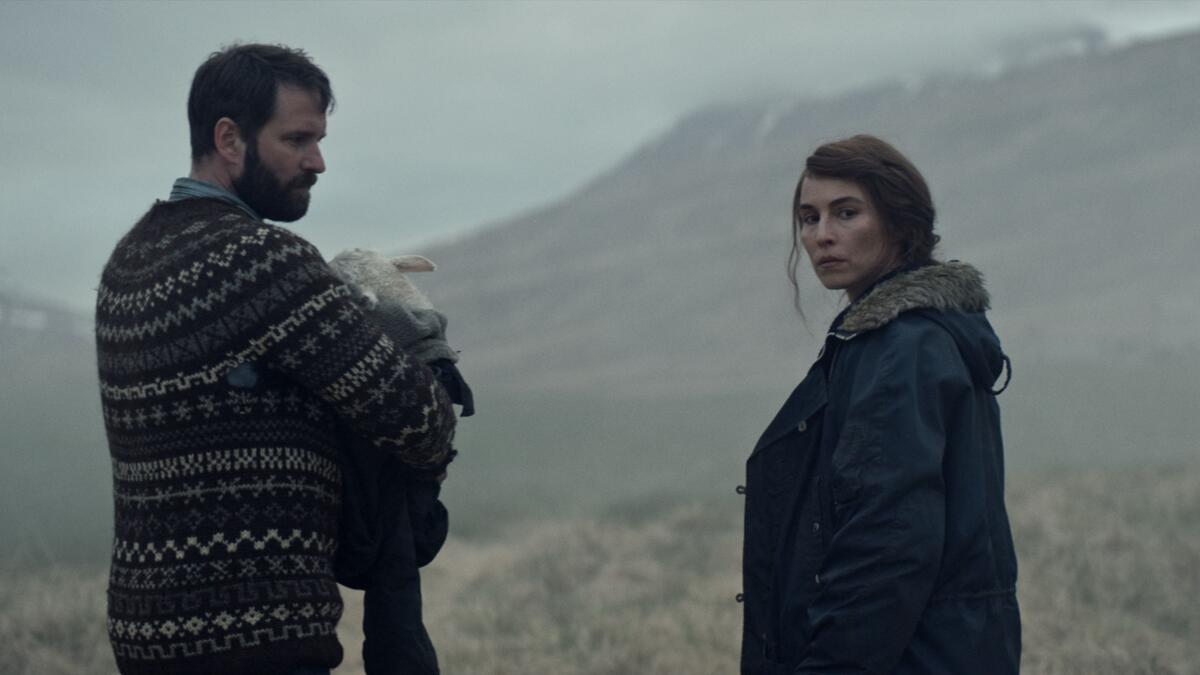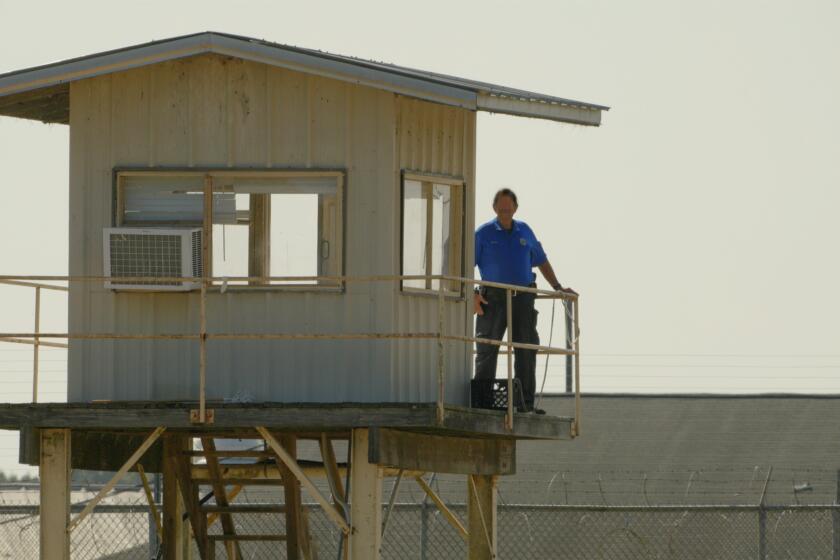Review: Horror haunts the edges of darkly meditative Icelandic folk tale ‘Lamb’

- Share via
The Times is committed to reviewing theatrical film releases during the COVID-19 pandemic. Because moviegoing carries risks during this time, we remind readers to follow health and safety guidelines as outlined by the Centers for Disease Control and Prevention and local health officials.
In “Lamb,” Valdimar Jóhannsson’s directorial debut, the eyes have it.
It’s the eyes, both animal and human, that convey more than any speech, starting with a herd of chubby, wild-eyed ponies that scatter in a snowstorm upon recognition of an encroaching presence.
That menacing force remains largely unseen around the edges of this folk tale, though it’s alluded to in the gaze of an anxious sheepdog, or a watchful house cat skeptically standing sentry. Ominous mountains look down upon the pastoral arena where this fantastical yet meditative rural drama plays out; it’s a modern folk tale about the strange realities of life and death that such a closeness to nature affords.
As Maria, Noomi Rapace’s eyes are constantly searching, both the dramatic landscape and the face of her husband, Ingvar (Hilmir Snær Guðnason). They’re sheep farmers living in a remote Icelandic valley, with an ease to their taciturn quotidian rhythms and symbiosis with the sheep. Ingvar fries up a chop before he and Maria ease a slick newborn lamb into the world, their small circle of life constantly churning under the simple labors and pleasures of daily life. There is, of course, an incoming spoke in the wheel.
The film’s Big Reveal has already appeared in the trailer, and so it seems within bounds to describe its precise nature, though indubitably it would be much more incredible and shocking to watch this film without any idea of what’s coming. If you haven’t seen the trailer, stop reading now.
A lamb is born, though that’s not what’s remarkable. Unlike the other lambs, Maria and Ingvar bring this particular one inside, bottle-feed it, swath it in warm blankets, keep it in a crib that Ingvar pulls out from storage in their barn. They care for this little lamb as if it’s their own baby, much to the protestation of the ewe that birthed her, bleating plaintively outside their bedroom window. A maternal standoff ensues; it doesn’t end well for the ewe.
Finally, we get a peek at what’s under the the blanket. The lamb Ingvar and Maria have named Ada has a white furry lamb’s head with big expressive eyes, but the body of a human child. They raise and clothe and love Ada as their own, and she fills a profound void in their lives. When Ingvar’s deadbeat, washed-up rock star brother Petúr (Björn Hlynur Haraldsson) turns up on their doorstep, he’s astonished, bewildered and frankly disgusted. But he too becomes tender toward the little girl.
Fans of genre cinema, including Rapace’s roles as an action heroine, or the brand of arthouse horror for which the film’s distributor, A24, is known, may be expecting something a bit more intense from “Lamb,” which is mostly a quiet family drama. It’s a different register for Rapace, who remains controlled, with a few explosions of emotion. But she is present and instinctual, imbuing Maria with a steely but soft power: decisive, persuasive and feminine.
A sense of foreboding hangs over the proceedings, the score grinding with an industrial intonation, humming over the misty mountains and their snowy secrets. But fundamentally, “Lamb” is a folk tale, bookended with elements of horror, typical of darker fables; legends abound in the film, whether on a TV or in “The Story of Dimmalimm,” about a princess who falls in love with a swan who turns into a prince.
The film is broken into three chapters, and by the time it comes to its end there’s the startling realization that there is potentially much more to come, something even more bloody and terrifying — but those are tales better left for another day.
‘Lamb’
Running time: 1 hour, 48 minutes
Rated: R, for some bloody violent images and sexuality/nudity.
Playing: Starts Oct. 8 in general release
More to Read
Only good movies
Get the Indie Focus newsletter, Mark Olsen's weekly guide to the world of cinema.
You may occasionally receive promotional content from the Los Angeles Times.









